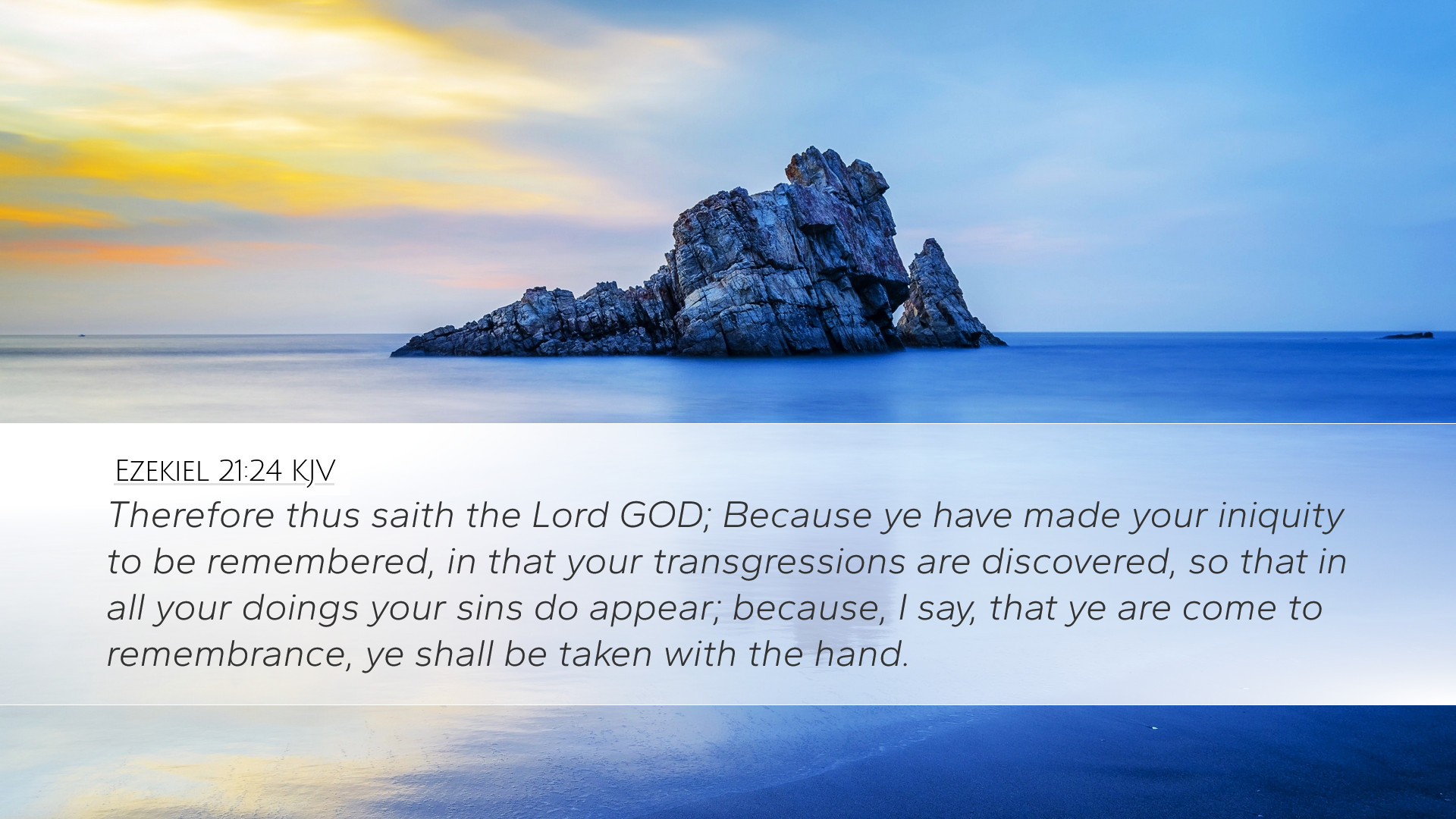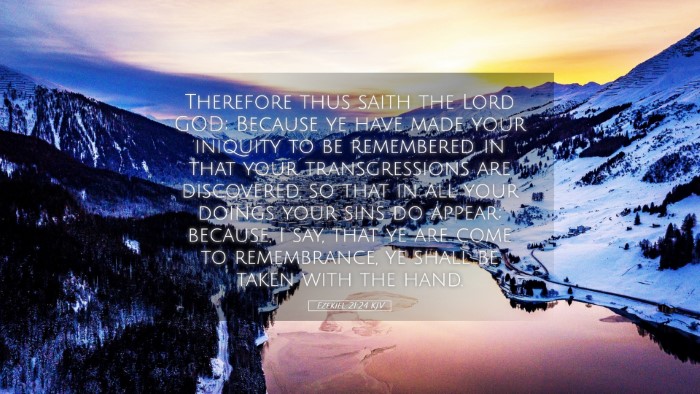Commentary on Ezekiel 21:24
Ezekiel 21:24 (KJV): "Therefore thus saith the Lord God; Because ye have made your iniquity to be remembered, in that your transgressions are discovered, so that in all your doings your sins do appear; because I say, That ye are come to remembrance, ye shall be taken with the hand."
This verse serves as a pivotal declaration from God through the prophet Ezekiel during a time of immense turmoil for Israel. It encapsulates the themes of judgment, remembrance of sins, and inevitable consequences of actions.
Contextual Background
Ezekiel's ministry took place during a critical period in Israel's history, particularly during the Babylonian exile. His prophetic messages were directed toward a people captured and displaced, grappling with their identity and faith. This context is essential for understanding the gravity of the divine pronouncement in Ezekiel 21:24.
Theological Insights
This verse reveals a profound truth about divine justice. Matthew Henry notes that God has a perfect memory, and sin cannot be forgotten without repentance. This verse is a reminder that the sins of Israel have come into remembrance—indicating that God is fully aware of their transgressions.
Albert Barnes highlights that the acknowledgment of iniquity is vital. The people are wrestling with the idea that their actions have carried significant weight in the eyes of God, and they must recognize that their sins bear consequences not only for themselves but also for the community. The phrase "ye shall be taken with the hand" signals the assured judgment which is imminent.
Understanding 'Iniquity to be Remembered'
When God states that their iniquity has been made to be remembered, He emphasizes the concept of accountability. According to Adam Clarke, the use of the term "remembered" implies that the consequences of their sinful actions are as real and present as their previous state of rebellion against God.
This concept brings to light the interplay between God's mercy and His justice. The people of Jerusalem have long sought to twist justice through idolatry and iniquity, believing they could escape the repercussions of their actions. The message in Ezekiel 21:24 shatters that illusion of impunity.
The Unveiling of Transgressions
The latter part of the verse, "in that your transgressions are discovered," indicates an unveiling process—where sins are brought from the darkness into the light. Both Henry and Barnes echo the sentiment that hidden sins will one day be revealed; this is a universal principle applicable at all times and in all situations. Such unveiling occurs not only in the present life but may also extend into judgment after death.
- Transformative Repentance: This serves as a call to repentance, urging individuals to confront their sins before they are laid bare. The nature of God's justice necessitates confession and genuine remorse.
- Collective Responsibility: The implications of personal sins resonate within the wider community. Corporate sin leads to community consequences, illustrating the interconnectedness of the community of faith.
Judgment is Inevitable
God's declaration, "ye shall be taken with the hand," is a metaphorical representation of swift and decisive action from the Lord. Adam Clarke states that this implies a forceful intervention, whereby God acts in direct opposition to their continued rebellion. It reinforces the reality of divine judgment, which must follow persistent iniquity.
Judgment is not arbitrary but grounded in justice and righteousness. Matthew Henry articulates that when divine patience is exhausted, the consequences are harsh yet just—providing necessary sobering for those who fall under divine wrath.
Contemporary Applications
For modern readers, Ezekiel 21:24 speaks volumes about personal and communal responsibility in faith. It urges individuals and communities to evaluate their moral standing before God, as well as the hidden sin that might lay dormant.
- Personal Reflection: Individuals are called to self-examination, recognizing how their actions implicate their relationship with God.
- Corporate Confession: Leaders and congregations must foster an environment where sins can be confessed, promoting accountability and restoration.
- Hope in Repentance: While this verse primarily communicates judgment, it simultaneously offers hope—acknowledging sin opens the door to the grace bestowed upon those who truly seek forgiveness.
Conclusion
In conclusion, Ezekiel 21:24 serves as a powerful reminder of God's justice and the consequences of sin. God does not overlook iniquity; rather, He desires repentance and a restored relationship with His people. The insights from public domain commentaries by Matthew Henry, Albert Barnes, and Adam Clarke enrich our understanding of this text, encouraging us to approach our spiritual lives with honesty, humility, and integrity.


